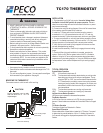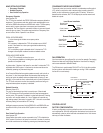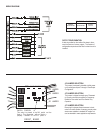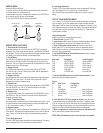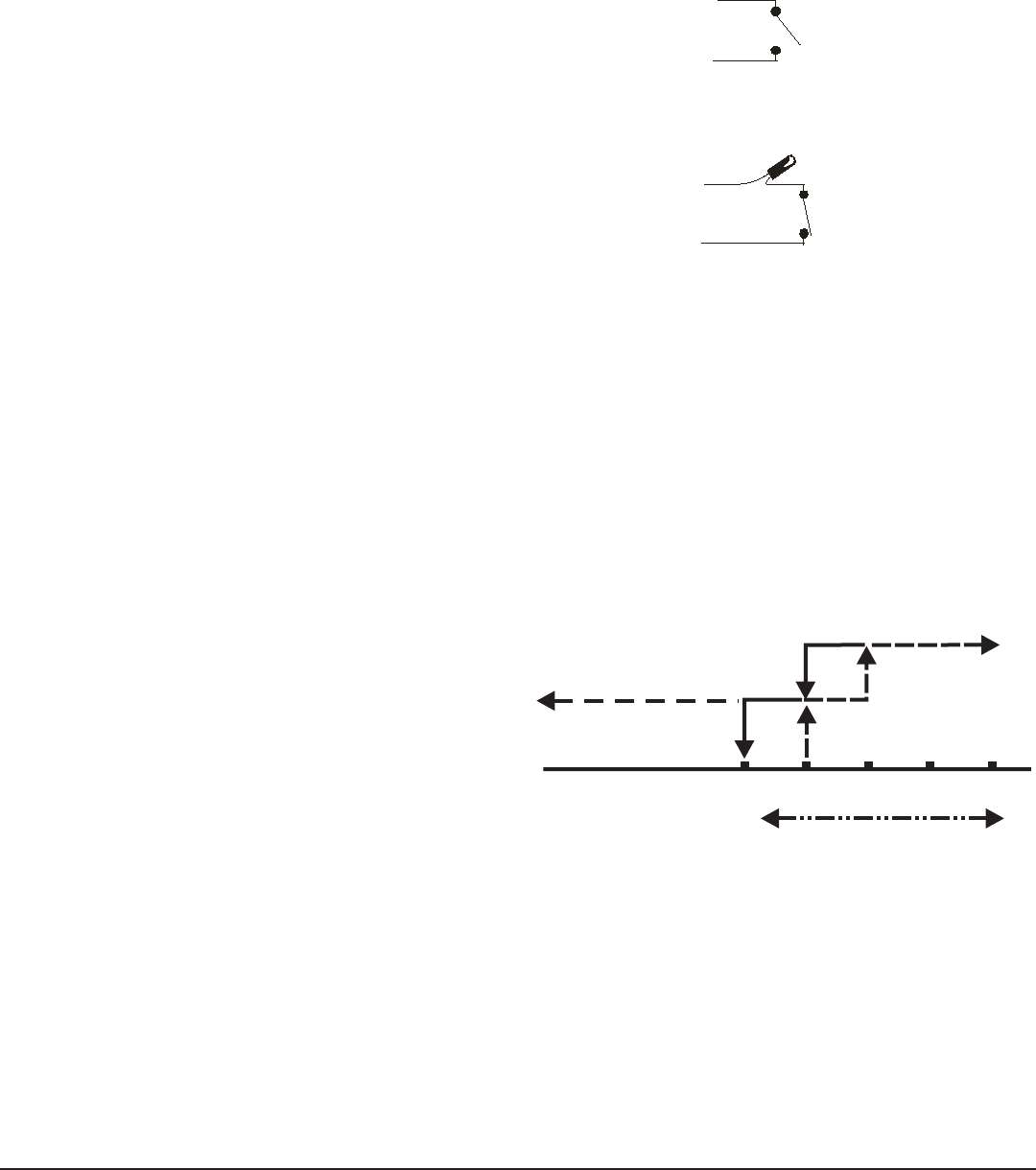
© COPYRIGHT 2008 PECO, INC. ALL RIGHTS RESERVED. P/N 69289 3220-2083 REV 0 PAGE 2
HVAC SETBACK SYSTEMS
Occupancy Detection
Setback Operation
Door Switch Only Operation
Occupancy Detection
Install jumper JP3.
The T170 can be used with the PECO S200 series occupancy detection
equipment. The occupancy and door switch inputs are designed to con-
nect to the SB200 slave sensor and SE200 door switch. The Occupancy
sensor switch is open when there is occupancy and closed when
unoccupied. The Door Switch is open when the door is open and closed
when the door is closed. This system requires both an Occupancy Sen-
sor and a Door Switch. Operation is as follows:
FROM OCCUPIED MODE:
1. A door close signal initiates an occupancy status
detection.
2. If occupancy is detected the T170 will maintain normal HVAC
control. It then waits for a door open signal before determining
occupancy again.
3. If no occupancy signal is detected within 2 minutes the T170
changes to unoccupied mode and controls at setback values.
FROM UNOCCUPIED MODE:
1. The T170 continually monitors the room.
2. Any occupancy detection, including door open, will set the
operation to occupied mode.
In either mode, if the door is left open for more that 2 minutes the T170
will disable the HVAC system. A one-time ten minute override can be
initiated by pressing any thermostat key pad.
In an Occupied State the thermostat operates normally and looks for a
door close. In the Unoccupied State the thermostat sets heating and
cooling set points to setback values, as determined by factory or user
settings. In this mode the fan is automatically set to cycle with demand.
The T170 will continue to monitor the occupancy sensor and will go to
occupied state anytime occupancy is detected.
Setback Operation
Remove jumper JP3.
This is a low level switch input that is normally open. When closed
the T170 Heating and Cooling setback limits are used as temperature
control points. Fan operation in setback is cycled with demand. Pressing
any button will override setback for 1 hour. Setback will override any
user setting except if the control is turned to OFF. Units with a controlled
off factory setting will override the OFF setting.
Intelligent occupancy sensors like the SD200-001 and SD200-002 can
be used with this input to set the HVAC system to control at setback
limits.
Door Switch Only Operation
Install jumper JP3.
A stand alone door switch can be connected to the T170 to disable the
HVAC system if the door is left open for more that 2 minutes. A one-time
ten minute override can be initiated by pressing any thermostat key pad.
•
•
•
CONDENSATE OVERFLOW INTERRUPT
The remote probe input can be used with a condensate overow switch
(CO), either in conjunction with a remote probe (normally closed CO
switch) or with local sensing (normally open CO switch). When con-
densate switch activates, the T170 will display the service wrench and
disable all outputs.
FAN OPERATION
Your thermostat can be congured for up to two fan speeds. Fan staging
follows the Heat and Cool Staging Separation. Heat and Cool staging
can be user selected to different values.
The FAN button is used to select FAN AUTO or ON. In the Auto position
the fan cycles on with demand for heating or cooling. If ON is selected
the fan will run continuously.
CONTROLLED OFF
FACTORY CONFIGURATION
A factory conguration may be provided to ensure minimum heat and
cool requirements. With this conguration the heat and cool outputs are
automatically cycled on at the heat and cool setback limits. Your thermo-
stat may not have this feature.
White/Yellow
White/Violet
Remote Probe
Circuit Common
Normally
Closed
Condensate
Switch
Remote Probe Installation
White/Yellow
White/Violet
Remote Probe
Circuit Common
Normally
Open
Condensate
Switch
Local Sensor Installation
Temperature Demand
SETPOINT
IF 2F
3F
4F
FAN 1 ON
FAN 2 ON
(FAN 1 OFF)
FAN AUTO:
Fan cycles on with demand
FAN ON:
Fan runs continuously



